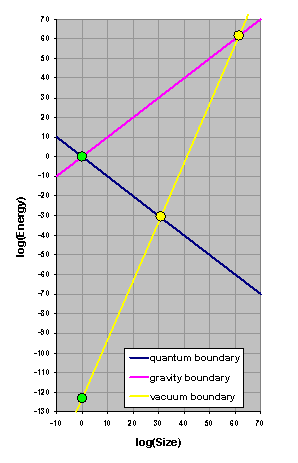Marking the grand arena of physical reality

The diagram to the right, from this article, shows the boundaries that define the domain in which we can make observations about physical laws.
Digest that for a few days - if only because it's worth it - even read a few more posts, for example the one about getting rid of dark energy. Only then come back here, because what I'm going to say doesn't mean much outside of this context.
The first thing that popped into my mind when I read the article myself was that I had seen that number before:
10^-123
....which is the measured value for the cosmological constant, expressed in Planck units. Planck units, or "natural units", are units of measurement like the kilogram, light year, Joule, and so on, but chosen in such a way that makes the value of a few fundamental physical constants equal to exactly one, such as the speed of light and Planck's constant. Wikipedia can tell you all about it if you're interested.
Surprisingly, it didn't take long for me to find out where I had seen it, it was the exponent (!) of Penrose's figure for the ratio between the entropy of the Big Bang and the entropy of a universe with all its matter collapsed into a black hole. I couldn't even resist the temptation to leave a comment on the article about this marvellous coincidence. Add this to the coincidence that the vacuum boundary crosses the quantum boundary exactly at the point where the energy of the background radiation is located, and suddenly I couldn't believe anymore that these were coincidences at all.
So Penrose hinted about it just enough to get me thinking, and now it just stared right into my face. Gravity is an entropic force, i.e. you experience gravity because that's the most likely thing to happen, similar to a lump of sugar that'll likely dissolve in a cup of tea. Why exactly, I don't know yet. I'll have to write more about that later.
Back to the article. A hidden but important point in my opinion is that it shows that there's no good description of the 'vacuum' boundary yet. Let me elaborate on this a bit more by going back to Einstein and his "biggest blunder". Because the equations of general relativity implied a universe that could not be in equilibrium, he bluntly added a cosmological constant to compensate for this. When Hubble actually discovered the universe to be expanding, Einstein realized he could simply have predicted this, and he henceforth referred to the cosmological constant as his biggest blunder.
Now what do you think about these principles, or assumptions maybe?
- The cosmological principle: the laws of Nature do not imply something special about our time or location.
- The principle of relativity: the laws of Nature are completely independent of the speed of the observer.
- The gravitational constant and speed of light are constant, therefore also the gravitational boundary.
- Planck's constant is also constant, therefore also the quantum boundary.
- The background radiation is a dilution of the cosmic fireball that was the Big Bang. When our universe grows older, the background radiation thins out even more.
At least Einstein was right about the cosmological constant not being a constant. I'm sure that would be the last thing he wanted to be known for.
But seriously, I'm gonna have to choose one of my assumptions and openly declare it to be false. Which one is it gonna be...? Your choice is as good as mine.
No comments:
Post a Comment